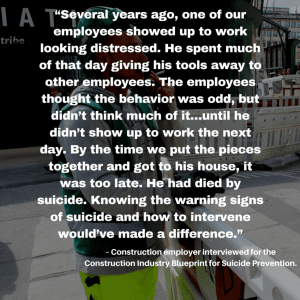Mental Health in Construction
As a construction worker you are six times more likely to die from suicide than from a fall from a height.
Sadly, there are more and more construction related statistics of workers who have either taken their lives or considered it.
Why is mental health in construction so poor?
The construction industry has higher than average rates of suicide. Why is that?
Construction jobs are still predominantly taken by young males. Suicide is the biggest cause of death for men under 35 (ONS).
12.5% of men in the UK are suffering from one of the common mental health disorders. Furthermore, those in occupations that don’t require any education after secondary school are at a higher risk of poor mental health and suicide, all adding to the picture of mental illness in construction.
The construction industry can also be known for long hours, long commutes, time away from family and exhaustion which can trigger a mental health illness. Some construction workers deal with these triggers daily.
Maybe a less obvious factor is the structure and schedule of work; some workers are only on sites for a few days, often the case with sub-contractors who will move from job to job. Working in such a fragmented manner can lead to more feelings of isolation, in contrast to the usual image of camaraderie in the construction industry. Furthermore it is difficult to share health and safety awareness messages when workers are on site for short periods of time. These numerous factors all contribute to why mental health in construction is so poor.
Why does poor mental health go unnoticed?
Construction workers are known to have a tough persona, not wanting to ask for help, as well as the male gender being less likely to open up.
In addition, colleagues may not recognise some of the signs due to the constantly changing workforce on site.
What can we do?
The World Health Organization is predicting depression to be the world’s second biggest health problem by 2020.
What can we do to help in our offices and on site?
We can all create an open dialogue about mental health and improving our mental health.
We can be aware of any changes in coworkers and not be afraid to speak to them and address it.
What to look out for:
- Increased tardiness, absenteeism, and presenteeism (showing up to work physically, but not able to function)
- Decreased productivity due to distraction and cognitive slowing
- Decreased self-confidence
- Isolation from peers
- Agitation and increased interpersonal conflict among coworkers
- Increased voluntary and involuntary attrition
- Increased overwhelming feelings
- Decreased problem-solving ability
If you are worried about a colleague, giving them 5 minutes can really make a difference. Why not offer them a cup of tea or coffee to encourage conversation, or ask them to join you for a breath of air and walk to the shop at lunch time. Even organise a weekly football 5-a-side or offer them to join your training session at the gym. Any way that makes them comfortable and provides an opportunity to open up.
In the UK you can reach the Construction Industry Helpline at 0345 605 1956 for confidential 24/7 support.
Thanks to GenieBelt for the facts.

Read more of our resources on Mental Health in Construction.
